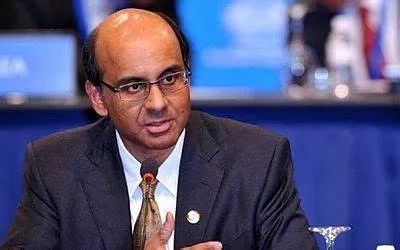World Economic Forum: Creating a Reputable and Trustworthy Digital Currency (Part 2)
Translation / Proofreading: Long Baitao
Guide
What does Libra have to do with regulation? Davos, the two central bankers and Libra's head, representing the forefront of stablecoin global regulation.
On January 24, 2020, Sheila Warren, Head of Blockchain and Distributed Ledger Technology at the World Economic Forum, Tharman Shanmugaratnam, Chairman of the Monetary Authority of Singapore, David Marcus, Head of Facebook Calibra, Valdis, Executive Vice President of "Serving the Economy for the People", European Commission Dombrovskis, Benoît Coeuré, Head of the BIS Innovation Hub, and Neha Narula, Director of the MIT Digital Currency Program, discussed the opportunities, challenges, and concerns of digital currencies at the World Economic Forum's "Building a Trustworthy and Trustworthy Digital Currency" panel meeting. This is a discussion about the highest level of stablecoin. The Chairman of the Monetary Authority of Singapore Tharman and the head of the BIS Innovation Hub Benoît are co-chairing the stablecoin working group of the Financial Stability Board. Its task is to provide stablecoin supervision policy recommendations for global regulation. The head of Calibra is essentially the head of Libra. Everyone in the group meeting is the right person to make (digital currency) happen.
Summary of group discussion ideas
Calibra / Libra Head David Marcus
- Viewpoint | Fully open Bitcoin ledger is a double-edged sword
- QKL123 market analysis | Bitcoin miner fled, miner's crazy indicators need to be reversed (0318)
- This platform is a bit stable: I have two or three things with Bybit
- When the Libra plan was released, some people mistakenly assumed that Libra was a shaped product and had solved all the problems. Facebook just started a conversation. Now that the Libra Association has established full governance, all members can begin to make decisions together and resolve issues with one voice.
- The value of Libra is to provide a good technical solution for the networks needed to carry digital currencies issued by different entities, including central banks and the private sector. Libra is committed to agreeing on standards and methods for transferring digital currencies.
- I hope that we had today's dialogue (with supervision) a year ago, so that we can form a supervision system, let Libra and other similar projects really see the light, correctly define what is feasible and not feasible, and how to do it in a responsible way. At this point, it is possible to deliver benefits and avoid the unintended consequences of innovation.
- Programming currencies and smart contracts will truly empower digital currencies and carry out a series of innovations around the financial system.
- The digital currency ecosystem has considerable diversity, and it must be a mixture of public and private solutions.
- Technological change usually comes from the private sector and usually not from the public sector. Most innovations will be provided by private players.
- CBDC's international coordination is crucial. It is not expected that cryptocurrencies, stablecoins or CBDCs of large economies will undermine the currency sovereignty of smaller economies.
- The diversity of digital currencies must be accepted, because different cultural methods, different financial systems, different populations, etc., but common principles need to be formulated, which is related to system stability and interoperability.
- BIS will continue to bring people together to ensure that no matter what they do, no matter how fast, they must keep in mind the benefits of the global system as a system and the consequences of everything they do to global financial stability. The global financial system is sufficiently fragmented, and CBDC is not expected to be an additional source of fragmentation.
- The consequences of different models must be considered, wholesale, retail (CBDC), etc. So you should not rush. It's been a long journey and it just started now. The sooner this journey begins, the better.
Tharman Shanmugaratnam, Chairman of the Monetary Authority of Singapore
- Three major use cases for digital currencies: the efficiency and cost of cross-border payments, financial inclusion and the eradication of illicit finance.
- Digital currencies can change culture. For example, in China or Kenya, older people accept digital cash at an alarming rate.
- Digital currency will be a hybrid system and will face stricter public oversight. Not only monitoring infrastructure, but also the structure above it, to avoid money laundering and excessive rent seeking to a minimum. But the public sector does not have to be a provider of infrastructure and the above structure. Different national conditions will have different situations, such as the Chinese central bank effectively issuing digital currencies. The structural innovations brought by digital technology and innovations that bring better value to customers are usually not done by the public sector. Maintaining currency sovereignty is the trickiest part.
- Slowly, this should be the way we deal with the whole problem of digital currency, we should keep an open mind, and we should not rush to find a solution.
Valdis Dombrovskis, Executive Vice President of the European Commission "Serving the Economy of the People"
- The bank's requirements on capital adequacy ratios, anti-money laundering, etc. have led to the "de-risk" phenomenon of banks and triggered financial exclusion.
- In the European Union, fintech has the potential to leverage the entire EU single market for financial innovation. We want to embrace financial innovation while tackling risk.
- The balance between the public and private sectors is very important. The public sector needs to provide a correct framework to consider important issues that the private sector may not be able to solve, such as avoiding large companies infringing on user sovereignty and protecting user data.
The full group discussion (below)

Sheila: Thank you. As a quick reminder that the central digital currency is essentially a digital fiat currency, the stablecoin is simply pegged to the fiat currency. How should we look at this spread, I don't want to say that there are a thousand flowers in bloom, but certainly a thousand seeds seem to have been planted? Will we inevitably see integration, or how do you understand a world with a large number of stablecoins? Neha, I start with you.
Neha: There will definitely be competition initially because we will try many different ideas. It's important to note that (competition) space is still in its infancy. We are still determining what the right technology stack is, what the exact use cases are, and how to use the platform. So I think we will see a lot of different stablecoins. They will compete with each other. But I do think that CBDC is the real answer in the end. Issuing CBDC directly will reduce risk. It allows the central bank to provide public options for the currencies it should provide. In the next few years, we will definitely have more stablecoins. But if CBDC does happen, it will be a better choice.
David: As far as we are concerned, we like CBDC, don't get me wrong. The difference is good, so that's what I want to say, the way we look at the world, basically, is really unfortunate. If you have the proliferation of a fragmented network, the network lacks interoperability and cannot transfer value to each other. And this value needs to be passed on to those who need it urgently. If you use a wallet or any other wallet, there is an interoperability layer at the core of the network you use. The internet used to be like this. If you use Gmail, you can't send email to people who use Yahoo mailboxes, that would be unacceptable. But if you use the wallet app today, that's the case. You cannot send payments outside the wallet app. I must praise the EU here. With SEPA (Single euro payments area), if you are in a bank in the euro zone, you can send money to any other bank and it works just fine. But this is not the case in other parts of the world. So what really matters to us is to find out what is the right network to host these stablecoins or CBDCs. We certainly have an opinion on this (ie Libra). We bring a good technical solution to the network itself. I do want to distinguish the network from the assets that run on it. These assets can be issued by many different entities, whether by the central bank or, in some cases, the private sector. In this new era of stablecoins and digital currencies, if we agree on the standards and methods for transferring digital currencies, people will eventually benefit. This is really important to me.

Benoît: When you imagine the future, it is not set in advance. We call it the currency ecosystem, and it can be quite diverse. It must be a mix of public and private solutions, just as the payment world has always been. Competition will be good because, in the first place, we discuss how technology can help improve efficiency and financial inclusion. Technological change comes from competition, from the private sector. It usually does not come from the public sector. Sorry to say so. So we need this kind of stimulation, this pressure, innovation from the private sector. But to put it simply, the closer you are to the core of the system, the more likely you are to see the currency of the central bank, as this is an element that provides stability to the system. We care about system stability and financial stability. We have built a system based on Real-Time Full Settlement (RTGS), which works well. The RTGS system uses central bank currency for settlement. For the past 20 years, the system has worked well in all crises. Other parts of the financial system have shown many shortcomings. Contrary to these parts of the financial system, RTGS has never failed. So we want to maintain this stability at the core of the system. Now when you move from the back end of the system to the front end of the system, the front end provides customers with payment solutions, and there is a lot of room for innovation here. Most, if not all, innovations will be provided by private players.
Tharman: Sorry, when we think of those use cases, I want to take a step back a bit: the efficiency and cost of cross-border payments, financial inclusion and the eradication of illegal finance. It is clear that public policy must be involved. There must be relevant regulation, minimal regulation, to prevent money laundering, whether it is the digital world or the physical world where you are already regulated. What is not clear is that the public sector also needs to be a provider of infrastructure or the top of the infrastructure. Therefore, it is not clear whether to provide all the tracks or also the structure running on the wheels. You need regulatory certainty. We do hope to establish an open and interoperable system at home, especially internationally. CBDC is not interoperable. They are not necessarily interoperable. They separate the stacks of nations. So keep in mind that the difference between public and private is not the difference between public and closed. There are actually four quadrants. You want to be in a quadrant that is open, interoperable, and well-regulated, but at the same time a quadrant that encourages innovation, which is in both the track and the building. Beware of unintended consequences. Not thinking about what happens in peacetime but in crisis. If you lose confidence in one bank or several banks, what happens if you have a CBDC. It (Retail CBDC) is highly democratized. Compared with the normal banking system, there is much more money flowing from banks to the central bank. Therefore, we must realize that in times of crisis, people will take money from commercial banks and retail deposits and give it to the central bank. This is risky.
Think again from a national standpoint. One of the traditional problems facing emerging countries is related to the so-called original sin. It's easy to dollarize your economy. Some are not your own digital currency, and non-domestic digital currencies can be dollarized-I am not specifically referring to the dollar-but the dollar equivalent is much easier. Keep this in mind. So think about the design of the solution, not only in peacetime, but also what happens when you encounter difficulties and when a country or bank encounters difficulties. So I don't want to draw conclusions now. I think you need public management of the track and the structure on the track anyway. You don't want to stifle innovation. You don't want to hinder innovation. This is thanks to the private sector, which, spurred by new technologies and entrepreneurship, has seen a series of innovations that support a more inclusive financial system. Just offering one currency or token does not take us far. What is happening now is that the structure above the track actually allows smart contracts: for example, smart contracts that allow insurance contracts to be triggered automatically when encountering severe weather or earthquakes, or when the wind speed changes; for example, when bonds mature A smart contract that automatically makes payments to bondholder accounts. Because the private sector and innovation are operating, (we see) a variety of efficiencies and ways to serve end customers. So don't stifle innovation. So I say this only as an option. It is not clear that the central bank acts as a proxy for the public sector as a provider of railroad or railroad products. This may be the solution in some countries where the financial sector is very underdeveloped and there may be many rent-seeking activities. But I just worry about getting too far into the retail space.
Benoît: I just want to emphasize that for efficiency and stability, international coordination at the CBDC is very important. (This is related to) efficiency, because we hope that any time we have electronic euro, electronic pound, or electronic yen, etc., the CBDC of any economy can be used for cross-border payments. We hope this can be effectively used for remittances. We hope that in developing economies, payment providers can plug in and provide better solutions. Developing economies are a major development force. So this is important for the efficiency and inclusiveness of the system. This is also important for stability because, as Tharman said just now, we don't want cryptocurrencies or stablecoins, or even a CBDC in a large economy to undermine the currency sovereignty of smaller economies. This will therefore be a major theme of international cooperation. The International Monetary Fund will work to this end. I expect that this will be a major theme of the International Forum next year.
Sheila: These are wise warnings, and I think we all need to consider not only the establishment of two fringe cases, but also the unintended consequences of any such opportunity, which is good for us. But I want to change it slightly. We have been implicitly focusing on currency as a means of exchange, but there are other very important uses of currency-as a means of sovereignty. I mean, sovereignty can be expressed in two different ways. One is the ability of governments to interact with each other. This makes it roughly described as a matter of sanctions. It also serves as a means of celebrating or preserving culture. This is usually quite literal. I mean in many countries, monarchs and royalty are printed on currency. But they are just other cultural aspects of exchanging paper money or coins, and may actually cause quite profound changes in the way we think about interacting with each other. So I would love to get anyone's comments on these concepts in the group.

Valdis: Of course, unless this is not a new discussion. As early as the 1970s, Friedrich Hayek had been talking about Dennett's monetary organization and the competition between different private currencies. But I don't think we have reached that stage yet. From this perspective, we did not cover this aspect in the previous discussions, but if we discuss, for example, global stablecoin projects, issues of currency sovereignty and the efficiency of monetary policy will also be questioned. This is why the Federal Reserve and European regulators have raised so many questions about the libra project. Obviously, this raises many serious questions. In the EU approach, we distinguish between small fintech crypto asset initiatives and some global initiatives. The former may have its own problems, and the latter may quickly become systemically important. Of course, this also requires a fairly cautious approach by regulators and central banks.
Tharman: By the way, culture can change. What happened in China or Kenya is interesting. We think today's young people will quickly embrace digital cash. Surprisingly, older people-grandmothers-use digital cash so quickly. They adapt quickly. They may not be smart enough with their fingers, but you know this is just the norm. This has become the norm. Surprisingly, older people are already using digital means. It's more convenient and safer for them, no one can steal your wallet. So the culture changed.
David: I think when you solve problems, the culture changes. I think you know that many people today are stuck in the cash economy. If they have a window into the world economy, the ability to digitize their money, and more opportunities, this will change their lives. So when you solve a real problem for people, cultural change can happen quickly.
Sheila: Let's go back to financial inclusion, because this is usually the first use case or the second use case that everyone refers to, depending on your order. I want to distinguish once again what I mean by the political poor or the recognized poor-let's call them poor and certified-and the invisible poor-those that seem to be beyond the reach of the system poor. We know that these people are still mainly engaged in cash exchange. Can we realistically expect that digital literacy, which addresses the infrastructure needs required by this population, can address these prerequisites in a way that will allow us to truly abandon paper money or metal money?
Valdis: Of course financial exclusion is also a problem within the EU. We acknowledge this and, in fact, we have well-established legislation that basically requires banks to ensure that every European has access to basic banking services. Because in the past few years, banks did have many requirements in terms of capital requirements and anti-money laundering requirements. Many cases have led to what banks call “de-risking,” but in fact, this often leads to financial exclusion. Therefore, from this perspective, in Europe, we believe that everyone, as a natural person, is entitled to basic banking services. So fight this financial exclusion.
Benoît: I think this is a complicated discussion, there is no simple cause and effect relationship here. We've seen cases like this: technological change, especially mobile payments, has helped the poorest people overcome some of the obstacles they face in financial inclusion, especially bank accounts. Especially in developing economies. In other cases, technological change has accelerated bank account penetration, such as the Indian stack (Note: India's national fintech project). In some cases, we still need cash to solve the problems of some people who just don't know how to use a smartphone or are homeless and never have a bank account. In emphasizing the future, we must be very flexible. For different parts of the population, we will have different means of payment, and different ways in different parts of a country. So there is no single CBDC template. We must accept diversity because of different cultural approaches and because of different financial systems. What we need to do is to have common principles, because this is related to the stability of the system, and there is interoperability, because we want the system to work as a system. But in other words, there is a wide range of diversity within a country.

Neha: Yes, I just want to make a point. There is no one size solution, if any. Different countries will try different things, and different technologies will work in different places. I want to emphasize that it is very important to strike a balance between the public and private sectors. I think we are currently very slow and expensive in cross-border transactions, partly because we have left a lot for the private sector, which has not really taken us where we need them. Therefore, the public sector must speed up and provide an option to ensure we have the right framework. Consider very important issues that the private sector may not be able to solve. For example, it's interesting to review what happened to our Internet today. Several very large companies collect a lot of data about individuals, basically monitoring them, even as they move around their homes and cities. We need to make sure that such things don't happen in financial transactions. It is important to consider user sovereignty and user data. I am glad to hear that the European Commission is considering establishing a correct regulatory framework for financial transactions.
Sheila: So it sounds like we have expressed some potential benefits. We did hear some caveats. It sounds like we are at the beginning of a potentially relatively long journey before establishing suitability for these different types of use cases in different contexts. Before opening questions to the audience, I will invite panelists to make their final comments.
Tharman : So I think you know how to guess where we are now. The public sector is paying attention to this issue. It will be a hybrid system. Such hybrid systems will face more stringent public regulations, not only overseeing the infrastructure that runs these payment systems, but also some structures (above the infrastructure) to minimize money laundering and excessive rent-seeking. You don't necessarily see the public sector running this system. But in some countries, taking China as an example, it has a very unique situation. China already has two large private payment networks (Alipay and WeChat Pay). This is one reason why the People's Bank of China effectively issues digital currencies. It really provides a public option—low cost, and does not initiate information through third-party vendors. So you have such national conditions. But in my opinion, we should seriously consider the structural innovation brought by digital technology and provide customers with better value innovation. It is not usually done by the public sector (innovation). Defending sovereignty will be the trickiest part of this game. In my opinion, financial stability regulations, anti-money laundering regulations, etc., safeguarding currency sovereignty will be a very important part of it. Whether it is a private stablecoin or some synthetic multicurrency stablecoin or CBDC, the (currency) sovereignty of other countries will also become a problem.
Valdis: Okay, just a very brief message on the EU side. We are open to financial innovation and financial technology. We are willing to accept it. We are willing to ensure that in the EU, Fintech has the potential to leverage the entire EU single market for financial innovation. Therefore, later this year, we will release an updated fintech action plan to learn about Europe's next steps in fintech. We want to embrace it while tackling risk.
Benoît : Therefore, the BIS will continue to bring people together to ensure that no matter what they do, whether they want to do it faster or slower, they must keep in mind the benefits of the global system as a system, and what they do All consequences for global financial stability. There is a risk of fragmentation. The global financial system is sufficiently fragmented, and it may become more fragmented for various reasons. We don't want CBDC to be an additional source of fragmentation. So this will be our priority.

David: I am an optimist, otherwise I would not do what I am doing. But I'm really encouraged by today's conversation. A year ago, we were unable to have such a dialogue. This dialogue leads to a regulatory regime that will ensure that projects like ours (Libra) and others really see the light, properly define what is feasible and not feasible, and how to do it in a responsible way, thereby Make sure we can deliver the benefits I think we can provide without the unintended consequences of some innovations. So I am an optimist, and I think there will be a huge change and a huge revolution. (These changes and revolutions) will happen, which will benefit many who are often left behind. Tharman mentioned programmable currencies and smart contracts. In fact, I am very optimistic about this. We will be able to truly empower the digital currency and carry out a series of innovations around the financial system.
Audience questions
Q1: My question is David, you are optimistic. Of course, the Libra plan has received a lot of attention and questions. So when you read the G7 report and many of the questions raised in it, the question I want to ask you is, can you really remain optimistic? Or more specifically, when will we have Libra (startup), one year or two years?
David: So Benoît wrote and led the G7 report. I believe that all the concerns raised in the report are very legitimate concerns. We have to solve these problems for projects like ours (Libra) and many others. We totally agree. I think when we announced this project in June, someone misunderstood one thing, and that was that some people thought it was a fully formed product, and everything was clear, but it wasn't. We want to start a conversation. We have received a lot of feedback, but there are also a lot of legitimate concerns that we must address with practical solutions. I spoke with members of the Libra board. I would like to say that in the association, all members have made decisions together and started to address these issues with one voice, which is not possible until we establish full governance and all members have the ability to participate in this process. So yes, I am an optimist. I believe we will solve these problems. We must make a change. Eventually we will have a chance to really start, because the beginning of the journey is not now. The journey begins when this network starts to function, when various companies have the ability (based on this network) to start building products to serve consumers. I hope this day will happen sooner or later.
Q2: I'm Yan Qing (Note: Yang Yanqing, Deputy Chief Editor of China Business News). The question I ask central bankers and former central bankers is that CBDC with the characteristics of a "narrow bank" is leading to the de-intermediation of the entire (financial) system. Will it be an obstacle, so the central bank should move slowly in this direction?

Tharman : So this sentence means take your time. I think this should be the way we deal with the whole problem. We should keep an open mind. I don't think we should be in a hurry to find a solution. We should start with scenarios and problems. We should be soberly aware that the public sector should be involved where there are public goods, and where possible, we should monitor and motivate the private sector. I believe this system will involve more regulation than today. This will be necessary for very obvious reasons related to illicit finance, but it will also be necessary to ensure interoperability, ensure global coordination, and ensure that currency sovereignty is not lost. So this will be a more regulated system than it is now. But this does not necessarily mean that the public sector will be the provider of infrastructure and all digital tokens.
Benoît: So we have to think carefully about all the reasons Tharman just mentioned. Again, as your question suggests, this can have a profound impact on the structure of the financial system and financial stability. So we must consider the consequences of different models, wholesale, retail (CBDC) and so on. So we don't rush. This is a long journey, so start now. And because this is a long journey, the sooner we start, the better.
Sheila: I just added it from a forum perspective. We agree that this is very serious work and we are committed to supporting public-private cooperation in this area. To that end, earlier this week we (the World Economic Forum) released a CBDC decision maker toolkit, which we are piloting with central banks in Ottawa, Thailand and Bahrain. An analytical framework.
We will continue to update Blocking; if you have any questions or suggestions, please contact us!
Was this article helpful?
93 out of 132 found this helpful
Related articles
- Viewpoint | Blockchain is the source of power for the Fourth Industrial Revolution, empowering the Industrial Internet to build a new space for the digital economy
- Fidelity-invested crypto company Fireblocks officially integrates Compound, allowing institutional customers to earn DeFi interest
- Bitcoin's transaction price has fallen below the average mining cost
- Market Ineffectiveness Value Catcher: How Can the Crypto Asset Market Arbitrage?
- Behara Chain Foundation became a member of the IEEE Computer Association Blockchain and Distributed Accounting Committee, and led the proposal for a new standard for the IEEE Blockchain
- Bitcoin plummeted, where did the money go?
- World Economic Forum: Creating a Reputable and Trustworthy Digital Currency (Part 1)




